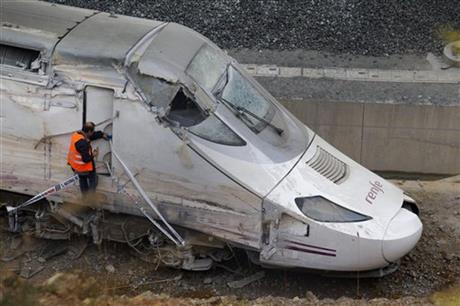 By HAROLD HECKLE
By HAROLD HECKLE
FILE – In this July 25, 2013 file photo, a rail personnel worker checks the cabin of a derailed train following an accident in Santiago de Compostela, Spain. A Spanish court official said Monday July 29, 2013 that judicial police would soon begin extracting information from the “black box” of a train that crashed last week killing 79 people and injuring some 130 in the country’s worst train accident in decades. It is hoped the box might establish what happened in the final seconds prior to the crash. The investigation has increasingly focused on why the driver failed to brake in time to stop the train from hurtling into a dangerous curve, where it careered off the tracks and slammed into a concrete wall. On Monday, Spain’s royal family and leading politicians were to attend a somber Mass in homage to the victims killed and injured. (AP Photo/Lalo R. Villar)
MADRID (AP) — The driver of a Spanish train that derailed, killing 79 people, ignored three warnings to reduce speed in the two minutes before the train hurtled off the tracks on a treacherous curve, crash investigators said Friday.
A court statement said the driver was talking on the phone to a colleague when he received the first automatic warning in his cabin of a sharply reduced speed zone ahead. The statement said the warning was by means of an audible sound but provided no further detail.
Police forensic tests on the train’s black box data recorders showed the last warning came just 250 meters (yards) before a dangerous curve where the accident occurred last week in Santiago de Compostela, Spain.
At that point, the train was going 121 mph (195 kph) when the speed limit was set at 50 mph (80 kph). Four seconds later the driver applied emergency brakes.
By the time Francisco Jose Garzon Amo applied the brakes, the train was already beginning to lose contact with the rails, the statement said. The total derailment occurred at 111 mph (179 kph).
Garzon has admitted in court that he was traveling too fast but could not explain to an investigating judge why he didn*t slow down earlier. He was arrested shortly after the crash but was released by the judge on provisional charges relating to multiple counts of negligent homicide.
In a court statement, the judge said the phone call, which came from the train’s on-board ticket inspector, had been inappropriate, but added that the accident “seems to have been caused, no doubt, by the driver’s inappropriate and unpredictable driving.”
Of the passengers who were injured in the accident, 54 were still in the hospital late Friday, nine in critical condition.
The investigation is expected to last several weeks before presenting its formal conclusions.



